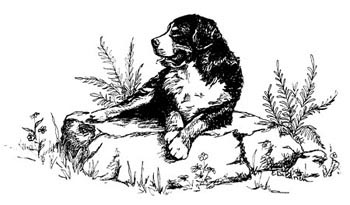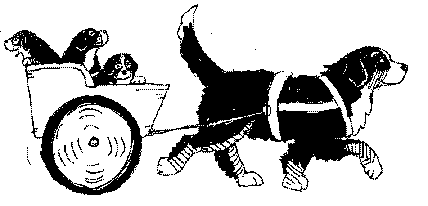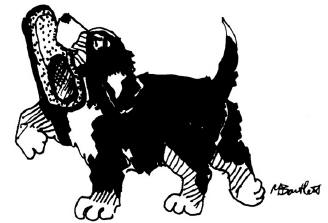
Is a
Bernese Mountain Dog right for you?
Temperament: A
pure bred dog will be consistent with the breed and hence, will allow
families to make an informed decision about how they’ll fit into their
family. Still, it needs to be understood that dogs, like people, are
individuals and temperaments do vary. The Bernese Mountain Dog Standard
states, “The Bernese temperament is one of the breed's strongest assets.
Consistent, dependable, with a strong desire to please. Self-confident,
alert, good-natured. Attached and loyal to human family; may be aloof or
suspicious with strangers, but never sharp or shy.”
Their strong desire
to please means they are happiest when working, and with their people.
Hence they may not be appropriate for people who work long hours and can’t
spend time with them. Generally, the significant caregiver will be their
favourite and training and socialization are needed for them to be well
adjusted in the family and household.
Size:
Bernese Mountain Dogs are considered large dogs and weights of 80 to 120
lbs are not unusual. Dogs 24.4 - 27.6 inches (62-70 cm); bitches 22.8 - 26
inches (58-66 cm). Height is measured at withers. The stocky,
well-balanced appearance is considered a must.
Coat:
The Bernese Mountain Dog’s coat is wonderfully soft to touch but if
shedding or allergies are an issue, do not get a Bernese Mountain Dog.
They need regular (weekly) grooming and have a tendency to matt under
their ears.
Exercise:
Bernese Mountain Dogs need
moderate amounts of exercise.
Health:
The
BMDCA Health
Survey
indicates that Bernese Mountain Dogs live an average of 7 - 8 years. Some
die younger and many live into their teens, but generally the breed is not
considered to be long lived. They’re also affected by orthopedic and other
issues, as are most large dogs. For additional information please refer to
the following:
http://www.bmdca.org/sheets/health.pdf


How to
Identify a Reputable Breeder
A
reputable breeder will generally be affiliated with a breed club such as
the Bernese Mountain Dog Club of Ontario (BMDCO).
|
Links for More Information on BMDCO Breeders
|
It is unusual for reputable breeders to advertise in newspapers as they
generally have a strong demand for their puppies and don’t need to.
Publications like ‘Dogs In Canada” may contain flashy ads, but that isn’t
an indication of ethical behaviour nor does it indicate membership with
the Canadian Kennel Club (CKC).
Reputable breeders
want to know if you’ll be able to provide a good home. This means they’ll
want to meet and get to know you before they’ll commit to you. In
addition, they should try to match you with a pup that fits your life
style and situation. For example, if there’s already a male dog in the
house it would be normal to suggest a female as they’ll integrate better.
They’ll be realistic
about what it means to have a Bernese Mountain dog and won’t try to
romanticize it in order to make a sale (puppies don’t come house broken
and their chewing can be destructive).
Reputable breeders
will be working to breed dogs that are sound in temperament, and health.
No breeder has bred the perfect dog or rid the breed of all of its issues
but they should give you the feeling that they’re trying. Proof of the
parent’s clearances indicating the parents are free of hip and elbow
dysplasia will likely be provided and you should be able to meet some
relatives of a perspective pup.
Reputable breeders
only sell registered dogs and most include a sales contract. The content
of the sales agreements can vary but typically include clauses of
guarantee and spay/neuter, non-breeding language. In addition, most dogs
are sold with CKC non-breeding papers.
It is unusual for
reputable breeders to ask for a down payment. A breeder will want you to
come back because you really want one of their puppies and not because
you’re worried about losing a deposit. Once they’ve done all they can to
breed a healthy puppy their priority will be on finding that pup a good
home.
Keep in mind that
adding a dog to your family is a significant commitment and shouldn’t be
taken lightly. It’s worth taking the time to do your homework to identify
a good breeder because the pup you bring home will become a member of your
family for (hopefully) the duration of its life.
Please note that
breeders don’t always have puppies available and hence some wait time
isn’t unusual.
For consequences of
not finding a reputable breeder please refer to the following website:
http://www.psychopup.com/tb/dontbuy.html


Bringing your puppy home
Prior to Bringing
Your Puppy Home:
After you’ve
identified a reputable breeder and agreed that one of their puppies is for
you, you then need to get ready to bring your puppy home. This is when
your breeder can provide invaluable help deciding whether or not to crate,
what food, and other items are appropriate.
Spend time to locate
a good veterinarian. Having a vet that you trust can be very important if
any health issues develop through out
the dog’s life. Something as simple as allergies can be treated many ways
and you’ll want to feel confident that your vet does what is right for
your dog and you. Get recommendations on a veterinarian and don’t feel shy
about checking them out. It could have a significant impact on the quality
of your dog’s life.
Your breeder should
take care of your Puppy’s first set of shots and have had them wormed or
their stool samples tested clear.
After Bringing
Your Puppy Home:
Your breeder should
provide a feeding schedule and/or guidelines of what and how your puppy
should be fed.
Please note that puppy’s stomachs
are small and hence frequent (3 is typical) meals will be necessary in the
beginning to avoid upset. Different breeders will vary which foods they
recommend. The important thing is that it be of sufficient quality to
supply the required balance and nutrients to support the puppies’
development without causing problems (like allergies).
The first night in
your home a puppy will be missing their littermates and can be soothed by
knowing that their new “family” is near by. Trying to isolate a puppy at
this age can be very upsetting and lead to sleepless nights for the rest
of the household. Something that has the smell of their old home can help.
You should take your
puppy to your Veterinarian for examination in the first few days. In the
initial visit you should establish the schedule of additional inoculations
which should be in line with your breeder’s recommendations.
A training facility
that offers Puppy school can get you & your puppy off to an invaluable
start. Just as with children going to school, puppies will benefit from
training. Learning some basics like sit, down, and come can go a long way
to making your dog a pleasant & well adjusted companion. Most puppy
schools also allow some playtime so dog to dog socialization skills can be
developed.
Again take your time
to find a training facility that you’re comfortable with and remember that
Bernese Mountain Dogs respond well to praise but can “shut down” if
treated roughly or negatively.
Also remember that
puppies need time to develop and need to rest frequently. It takes a lot
of energy to grow!
Dogs need time to get
the hang of house breaking and it’s not unusual for dogs to have set backs
up until about 6 months of age. Do not scold your dog if they make a
mistake as this can lead to them seeking privacy which can be very
inconvenient on the end of a leash! Praise, consistency and patience are
key.
A good resource for
training and understanding how your dog thinks is:
“How to
Teach A New Dog Old Tricks” by Dr. Ian Dunbar, IBSN 1-888047-06-2
Remember you may
think your dog is human like, but he looks at you and thinks you’re a
2-legged dog!

| The above articles in handout format
for printing. |
| Is a Bernese Mountain Dog Right
for you? |
 |
| How to Identify a Reputable
Breeder |
 |
| Bringing your puppy home |
 |